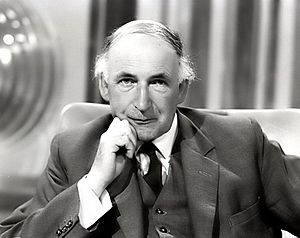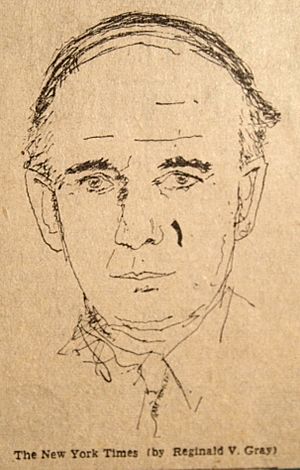Bernard Lovell facts for kids
Quick facts for kids
Sir
Bernard Lovell
|
|
|---|---|
 |
|
| Born |
Alfred Charles Bernard Lovell
31 August 1913 Oldland Common, Bristol, England
|
| Died | 6 August 2012 (aged 98) Swettenham, Cheshire, England
|
| Alma mater | University of Bristol |
| Known for | Radio astronomy |
| Awards |
|
| Scientific career | |
| Fields |
|
| Institutions | |
| Thesis | The electrical conductivity of thin metallic films (1936) |
Sir Bernard Lovell (born August 31, 1913 – died August 6, 2012) was a famous English scientist. He was a physicist and a radio astronomer. This means he studied space using radio waves. He was also the first director of the Jodrell Bank Observatory, a big science center, from 1945 to 1980.
Contents
Early Life and School
Bernard Lovell was born in 1913 in a place called Oldland Common, near Bristol, England. His father was a local businessman and a preacher. Bernard loved playing cricket and music, especially the piano, when he was a child.
He grew up in a Methodist family. He went to Kingswood Grammar School.
Becoming a Scientist
Lovell studied physics at the University of Bristol. He earned his first degree in 1934. In 1936, he got his PhD for his research on how electricity moves through very thin metal films.
During this time, he also took music lessons. The church organ was one of his biggest passions, besides science.
Working During World War II
Before World War II, Lovell worked at the University of Manchester. He was part of a team studying cosmic rays. These are tiny, high-energy particles that come from space.
When the war started, he published his first book, Science and Civilization. During the war, he worked for the Telecommunications Research Establishment (TRE). He helped create radar systems. Radar uses radio waves to find objects, like planes. He worked on systems for aircraft, including one called H2S.
In 1942, he helped recover a secret device called a cavity magnetron. It was from a crashed plane. Sadly, some of his colleagues died in that crash.
Starting Jodrell Bank Observatory
After World War II, Lovell wanted to keep studying cosmic rays. He tried using old military radar equipment. But there was too much electrical noise from the trams in Manchester.
So, he moved his equipment to a quieter place. This new spot was near Goostrey in Cheshire. This is where he started the Jodrell Bank Observatory. It was a perfect place because it had very little electrical interference.
While doing his experiments, he found that radar could detect meteor showers. These are bits of space rock that burn up when they enter Earth's atmosphere. He could even figure out the paths of these meteors. He showed they orbited the Sun, meaning they came from our own solar system.
Building the Lovell Telescope
With money from the university, he built the largest steerable radio telescope in the world at that time. It is now named the Lovell Telescope after him.

Even after more than 50 years, this telescope is still used today. It helps scientists learn more about space. It works with other telescopes as part of bigger networks like MERLIN.
Cold War Incident
In 2009, Lovell shared a story from 1963. He believed he was targeted during a visit to a Soviet space center. At that time, the Jodrell Bank telescope was also used as an early warning system for possible nuclear attacks. Lovell wrote down what happened. He wanted his story to be published only after he died.
Public Talks
Bernard Lovell was a great speaker. He shared his knowledge with many people.
- In 1958, he gave a series of radio talks for the BBC. They were called The Individual and the Universe. He talked about how we've learned about the solar system and the start of the universe.
- In 1959, he gave a lecture about "Radio Astronomy and the Structure of the Universe."
- In 1965, he helped give the Royal Institution Christmas Lectures. These are famous science talks for young people. His topic was Exploration of the Universe.
Awards and Honours
Sir Bernard Lovell received many awards for his important work:
- 1946 – He was made an Officer of the Order of the British Empire (OBE). This was for his work on radar during the war.
- 1955 – He became a Fellow of the Royal Society. This is a very high honor for scientists in the UK.
- 1960 – He won the Royal Medal.
- 1961 – He was made a Knight Bachelor. This is why he is called "Sir" Bernard Lovell. It was for his big contributions to radio astronomy.
- 1969–71 – He was the President of the Royal Astronomical Society.
- 1981 – He received the Gold Medal of the Royal Astronomical Society.
A school in Oldland Common, Bristol, is named after him. He officially opened it himself.
Personal Life
In 1937, Lovell married Mary Joyce Chesterman. They had two sons and three daughters. His son, Dr. Bryan Lovell, became a geologist at the University of Cambridge.
In his later years, Lovell lived a quiet life in the English countryside. He enjoyed music, his books, and a large garden. He had planted many trees in his garden decades before. Sir Bernard Lovell died at his home in Swettenham, Cheshire, on August 6, 2012.
See also
 In Spanish: Bernard Lovell para niños
In Spanish: Bernard Lovell para niños
 | Charles R. Drew |
 | Benjamin Banneker |
 | Jane C. Wright |
 | Roger Arliner Young |

